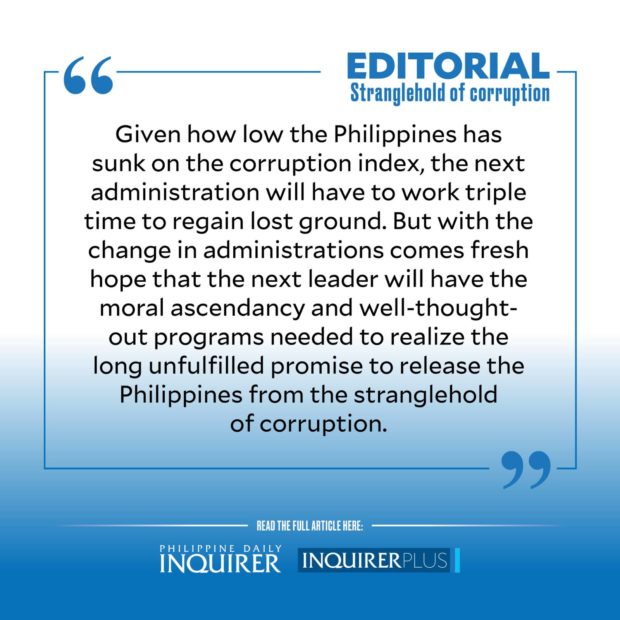Stranglehold of corruption
The Bureau of Customs (BOC) may howl in protest, but the candidates running to succeed President Duterte in the coming crucial May 9 elections have valid reasons to single out the notorious agency as the first target of their own centerpiece drive to rid the Philippines of the perennial scourge of corruption.
Just last week, the anticorruption arm of the Department of Finance (DOF) revealed that from July 2016 to December 2021, it investigated 468 employees of the DOF and some of its attached agencies for various complaints and questionable lifestyle, and 93 percent of them came from the country’s two largest revenue-collecting agencies—over half or 55 percent came from the BOC, while 38 percent were from the Bureau of Internal Revenue (BIR).
The DOF’s Revenue Integrity Protection Service (RIPS) deserves a pat on the back as these rigorous lifestyle checks and investigations yielded actual results, with 58 cases being filed against erring employees before the Office of the Ombudsman, Civil Service Commission, and other quasi-judicial bodies.
RIPS executive director Ray Gilberto Espinosa added in his report to Finance Secretary Carlos Dominguez III that from July 2016 to February 2022, 16 employees had been dismissed from office while 10 were found guilty in criminal cases. Another 35 were suspended, nine were reprimanded, and seven were ordered to pay fines as penalties for the charges for which they were held liable.
That the DOF has been doubling down on graft and corruption is a welcome development that should inspire other government agencies to follow suit with the same fervor. After all, taxpayers pay a hefty price for these high crimes that fatten the wallets of the unscrupulous few while depriving the overwhelming majority of Filipinos of vital projects and services rightfully due them.
Deputy Ombudsman Cyril Ramos had estimated that the government lost P700 billion each in 2017 and 2018 alone due to corruption, equivalent to as much as 20 percent of the total national budget and would have been enough to cover the needs of the education sector.
By this measure alone, Mr. Duterte fell far short of his fiery rhetoric during his campaign to “stop” corruption in “three to six months” after assuming power in 2016. Indeed, by his last State of the Nation Address in 2021, he was resigned to saying that corruption was “endemic” up and down the government bureaucracy.
Famous fighting words to not tolerate “even a whiff” of corruption were clearly not enough to cure the malaise, which even got worse during the Duterte administration with the Philippine slumping to its lowest rank on the closely watched global corruption index of Transparency International.
Based on the 2021 Corruption Perceptions Index (CPI), the Philippines dropped two notches to 117th place out of 180 countries and territories.
In addition, Transparency International said in a statement the Philippines scored a “historic low” of 33 out of 100 in a scale that measures perceived levels of public sector corruption. This is a rank below the previous year’s score of 34 on a scale that ranges from zero for “highly corrupt” to 100 as “very clean.”
The Philippines came in way below the global average of 43 and Asia-Pacific region’s average of 45. It is also a drop from the country’s highest score of 38, which was recorded in 2014.
“With a score of 33, the Philippines is a significant decliner, having lost 5 points since 2014. Since the election of Rodrigo R. Duterte (in 2016), the Philippines has also seen a sharp decline in freedom of association and freedom of expression, making it harder to speak up about corruption,” Transparency International added.
The Philippines also failed to meet the must-pass corruption standards of the US-based Millennium Challenge Corp. (MCC), preventing the Philippines from securing substantial grants that would have gone to big ticket development projects such as public roads.
The Philippines’ scorecard for 2022 showed that, just like in 2021, it failed to meet the standards on, among others, control of corruption, rule of law, and freedom of information.
“To be eligible to receive MCC funding, countries must pass at least 10 of our 20 indicators, as well as both categories that MCC considers ‘hard hurdles’ for eligibility—the political rights or civil liberties indicator, and the control of corruption indicator,” the MCC said last year.
The Philippines won its first and still the only MCC compact amounting to $434 million in 2011 and it covered three projects that built roads, reformed revenue administration, as well as supported delivery of social services to the poor.
But since 2016, the Philippines has failed to qualify for additional grants.
Given how low the Philippines has sunk on the corruption index, the next administration will have to work triple time to regain lost ground.
But with the change in administrations comes fresh hope that the next leader will have the moral ascendancy and well-thought-out programs needed to realize the long unfulfilled promise to release the Philippines from the stranglehold of corruption.





















